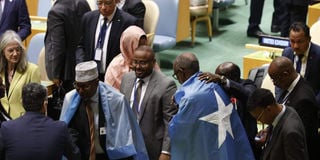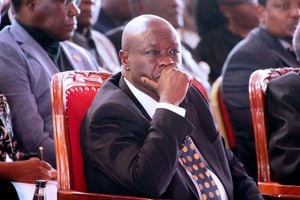Somalia to serve on United Nations Security Council

Somalia officials celebrate moments after the country was elected to serve in the United Nations Security Council
Somalia is among five countries elected to serve on the United Nations Security Council (UNSC) for the 2025-2026 term.
The other countries approved for his role at Thursday's UN General Assembly session are Pakistan, Panama, Greece, and Denmark.
The five nations secured the necessary two-thirds majority vote threshold with Somalia garnering 179 votes, while Pakistan received 182, Panama 183, Greece 182, and Denmark securing the highest number of votes at 184.
These nations will succeed Ecuador, Japan, Malta, Mozambique, and Switzerland, beginning their two-year terms on January 1st, 2025, and concluding on December 31st, 2026.
This marks a significant moment for Somalia, as it will be the country’s second stint as a non-permanent UNSC member. Pakistan brings a wealth of experience, having previously served seven terms. Panama, Denmark, and Greece will contribute their expertise, having held five, four, and two terms respectively.
The UN Security Council comprises two distinct member groups; five permanent members (China, France, Russia, the UK, and the US) and ten non-permanent members elected for two-year terms. These non-permanent seats are rotated annually, with five filled each year.
Geographic distribution plays a role in these elections. Two seats are allocated to African nations, one to Asia and the Pacific, one to Latin America and the Caribbean, and one to Eastern Europe.
To secure a non-permanent seat, a candidate country needs to win the support of at least two-thirds of the General Assembly's voting members. This translates to 129 votes out of the 193 total member states.
Prior to this, Somalia has gained successive wins in different sectors under President Hassan Sheikh Mohamud including;
EAC Membership:
President Hassan Sheikh can claim a significant foreign policy victory with Somalia's accession to the East African Community (EAC). This move strengthens regional ties, opens up new trade opportunities for Somali businesses, and potentially attracts foreign investment. It's a major step towards economic integration and could act as a catalyst for Somalia's economic development.
Arms Embargo Lift:
The lifting of the UN arms embargo on Somalia represents another success for President Hassan Sheikh. This action allows the government to more effectively equip its security forces to combat threats like Al-Shabaab. A stronger military enhances national security and paves the way for a more stable environment, crucial for attracting investment and reconstruction efforts.
Debt Relief:
Securing debt relief for Somalia is a major economic achievement for President Hassan Sheikh. This reduces the country's financial burden, freeing up resources for critical areas like healthcare, education, and infrastructure development. Debt relief can also improve Somalia's creditworthiness, making it easier to secure future loans for vital projects.




